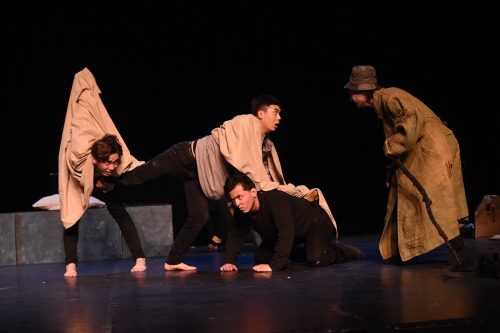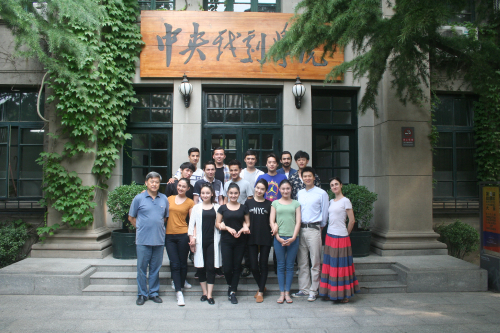 |
|
Student actors perform The Blue Bird at the Beijing North Theater in April (COURTESY OF THE CAD) |
In September 2011, Ablikim Ablat, a Uygur student from northwest China's Xinjiang Uygur Autonomous Region, started his four years of study at one of the country's top performing arts universities—the Central Academy of Drama (CAD) in Beijing. Though Ablat had prepared himself for a variety of potential difficulties beforehand, primarily those regarding performing and language skills, the first challenge came unexpectedly when the tutors ordered the young man and his classmates to get up every morning no later than 6:30 and exercise before breakfast.
"At first, we were incredulous about the requirement and tried to get out of it," said Ablat, remembering the dismayed reaction he displayed in those early days. "We argued with the professors, saying that we are here to study acting, not training to become athletes. But after two years of rigor, we understood the necessity of it." This summer, Ablat found himself grateful for the once-hated drill. As part of their graduation procedures, Ablat and his classmates staged a play at the Beijing North Theater from April 18 to 28. In each of the 15 performances, the Uygur student had to play five different roles.
"Despite this, I was full of energy and vitality, thanks to the training," he said.
The performances received thunderous applause from the audience, but that's only part of the reason why they were so special.
The class that Ablat belongs to has special characteristics. Known as the 2011 Xinjiang Class, it consists of 15 students from Xinjiang, including 12 Uygurs. The other three identify as either Han or Tajik. Before enrolling in the CAD, only three of the students had studied the performing arts. Worse still, some of them could not speak Mandarin Chinese and therefore had to learn it at the Minzu University of China in their freshman year. Beginning their second year of school, teachers of performing arts courses taught exclusively in Mandarin Chinese. Upon graduation, almost all the students had become fluent.
Though they have lived far from family members and friends over the past four years, students of the Xinjiang class said that the school and teachers have done the utmost to make them feel at home. For example, each student's birthday was celebrated with a party attended by the whole class and teachers. When the students rehearsed late before the graduation performance, the campus cafeteria providing halal food to Muslims and stayed open accordingly.
"We were so touched, "said Janijan Abdulla, the class monitor. "All the teachers are like family. We call Professor Xu Ping 'daddy' because after class, he was like a father to all of us."
The faculty includes Bulgarian Boryana Trifonova, who too had studied at the CAD and became the academy's first foreign teacher after her post-graduation.
The teaching drew on various schools of acting. Students from Xinjiang were taught the Attis School method of acting introduced by renowned Greek theater director Theodoros Terzopoulos. Inspired by ancient tragedy, the method stresses body language.
"The method not only trained us physically but also taught us to concentrate, to be able to hold our breath longer and increased our flexibility," explained Abdulla. "It calmed our fluttering nerves before we got up on stage. And most importantly, it was group training, so the class became one after we'd undergone training. It was very important when we rehearsed together."
 |
|
Students of the 2011 Xinjiang Class of the Central Academy of Drama, including Ablikim Ablat (first right, back row), Janijan Abdulla (second right, back row) and Shiliang Yixiao (second right, middle row) and their teachers Xu Ping (first left, front row), Li Yadi (second right, front row) and Boryana Trifonova (first right, front row), pose for a group photo on campus before graduation (COURTESY OF THE CAD) |
As the students became extremely skilled in using body language, The Blue Bird, the 1908 play written by Belgian author and Nobel laureate Maurice Maeterlinck, was chosen for their graduation performance. The plot revolves round Mytyl and her brother Tyltyl seeking happiness with the help of good fairy Bérylune. The Blue Bird is a metaphor for elusive happiness. As a masterpiece of symbolism, it fuses miracle, illusion and allegory.
"We the teaching team pondered over several weeks to decide which play would be chosen." said Xu, the mentor for the Xinjiang class. "The Blue Bird is full of mystery and fantastical elements. It is very suitable for the students to fully showcase their skills."
The rehearsals for the play ran into months so that at times, it was like "torture," said Shiliang Yixiao, one of the Han students.
"Theater performance is one continuous act on stage, which means we had to get everything perfect before the show," Yixiao said, "We had to keep on rehearsing for that. But as we went on repeating and repeating our lines and movements, we lost freshness and felt at sea. At times, we even disobeyed the teachers. But when the play was finally staged, we were so grateful to them!"During the performances in April, the young students from Xinjiang held the audience spellbound. Their costumes were simple, but the show, particularly the acting, sparkled. The performers played young boy and girl characters, as well as non-human roles—a cat, a dog, a tree and the abstraction Happiness—with equal ease. The students also provided their own live music. As the story unfurled, they played the tanbur, an ancient stringed Uygur musical instrument, and the guitar. They sang Xinjiang folk songs with gusto, peppered with pop songs and enlivened by Uygur dance steps, making the stage come alive with strong ethnic characteristics.
Li Yadi, Executive Director of The Blue Bird, did not explain what the bird stands for to the students until just one week before their first performance. He wanted all the students to develop their own interpretations.
"We all have our own interpretations about the blue bird, and we have pondered why we interpret it in the ways that we do," said Ablat. "For me, it was a good chance to think about life and the future. To me the meaning is simple: Do not get lost while trying to find your own blue bird."
It seems, for the time being, that Ablat has found his blue bird—or at least is well on his way to finding it on his journey to a bright future.
Copyedited by Kylee McIntyre
